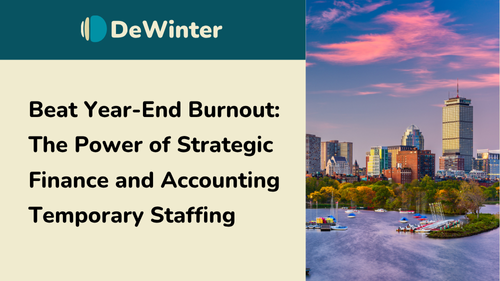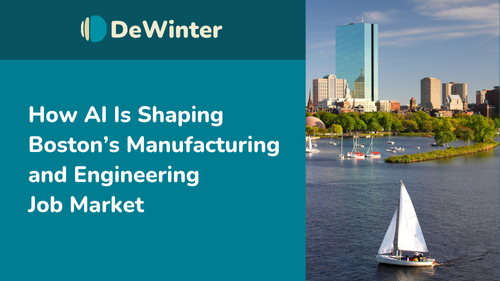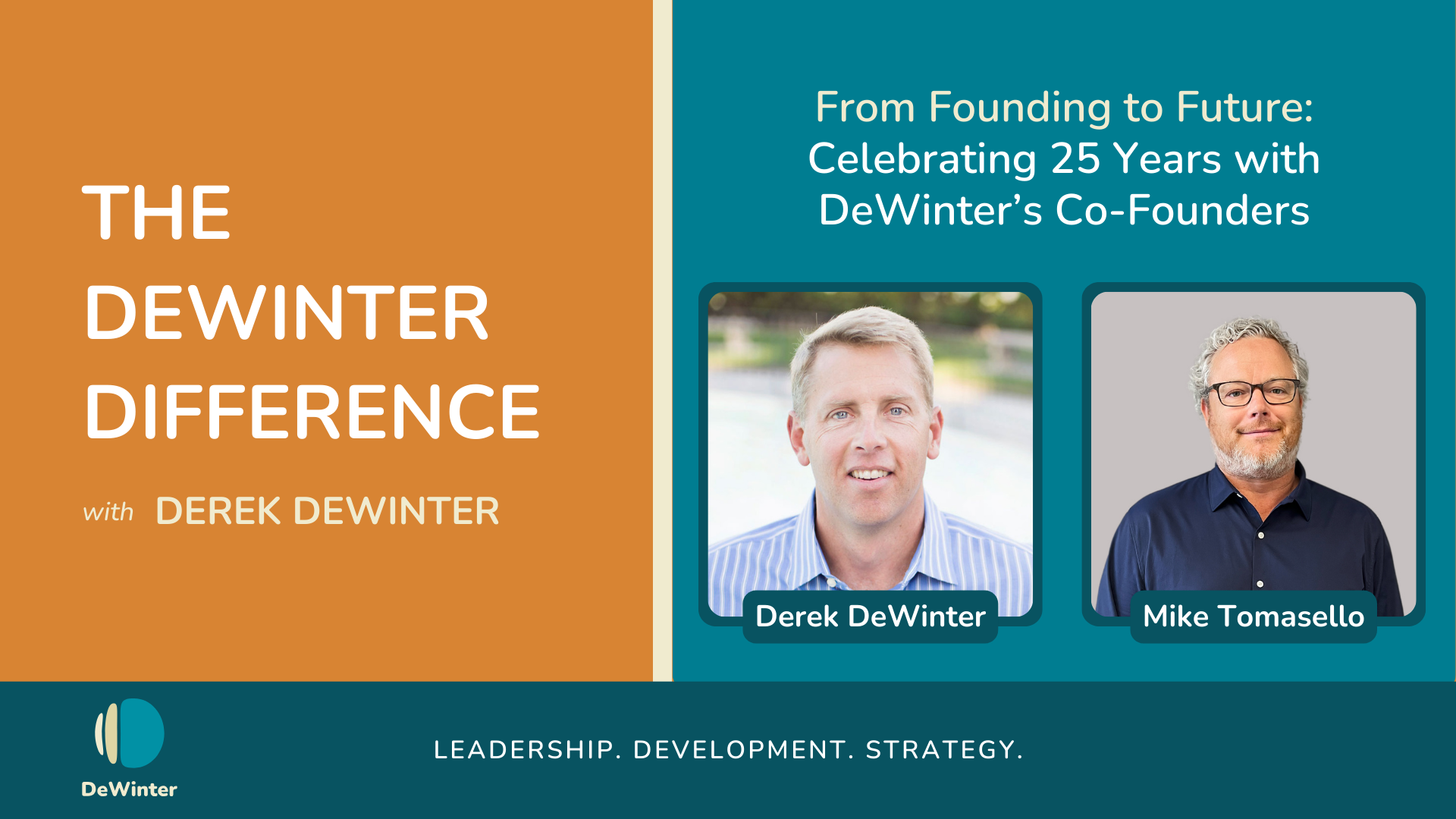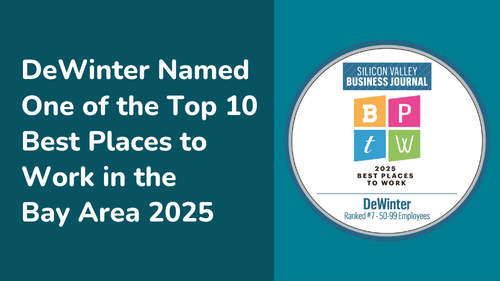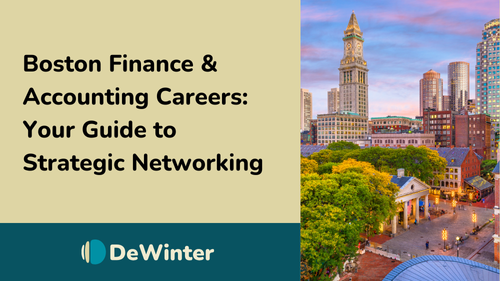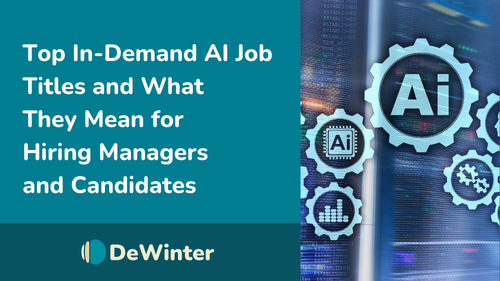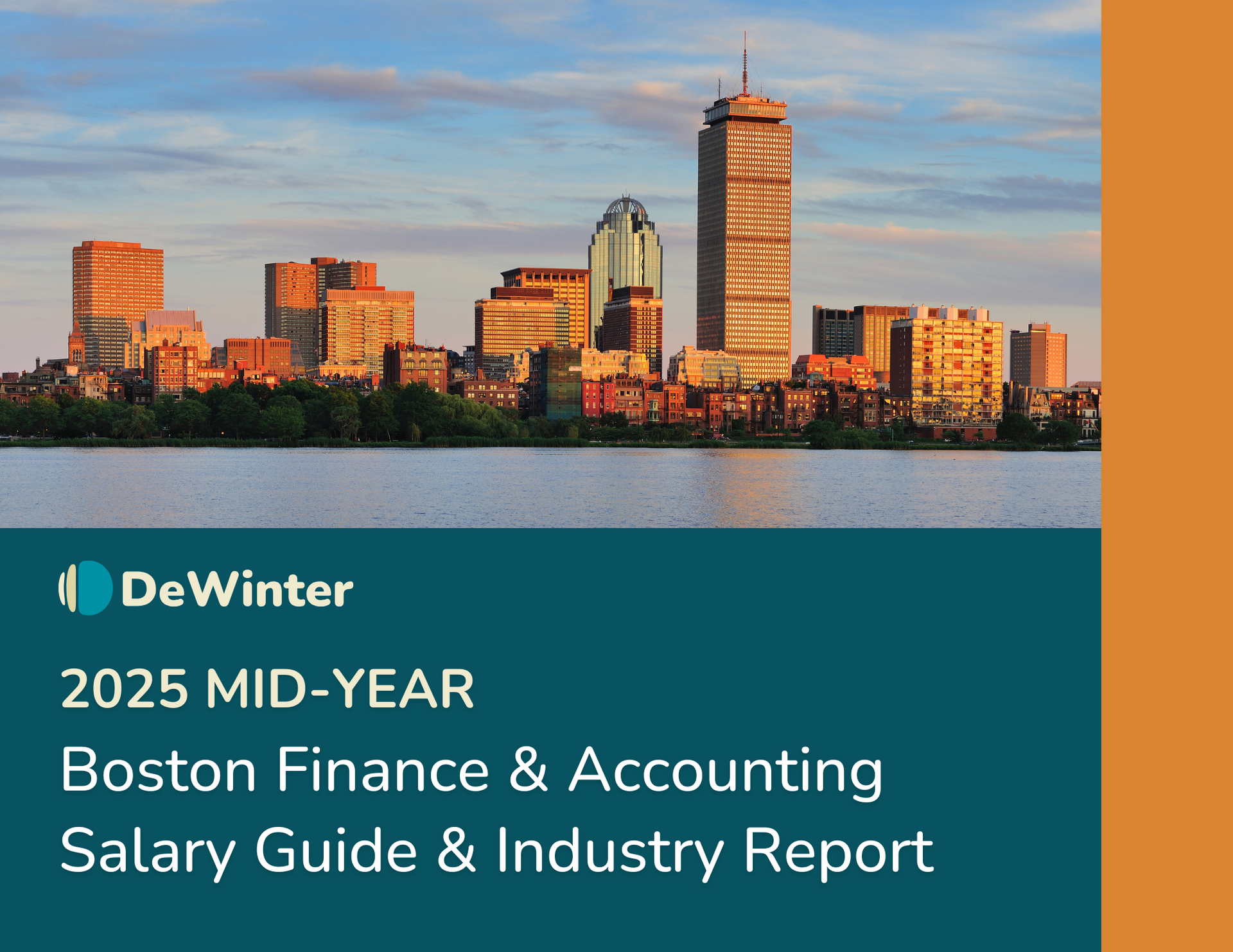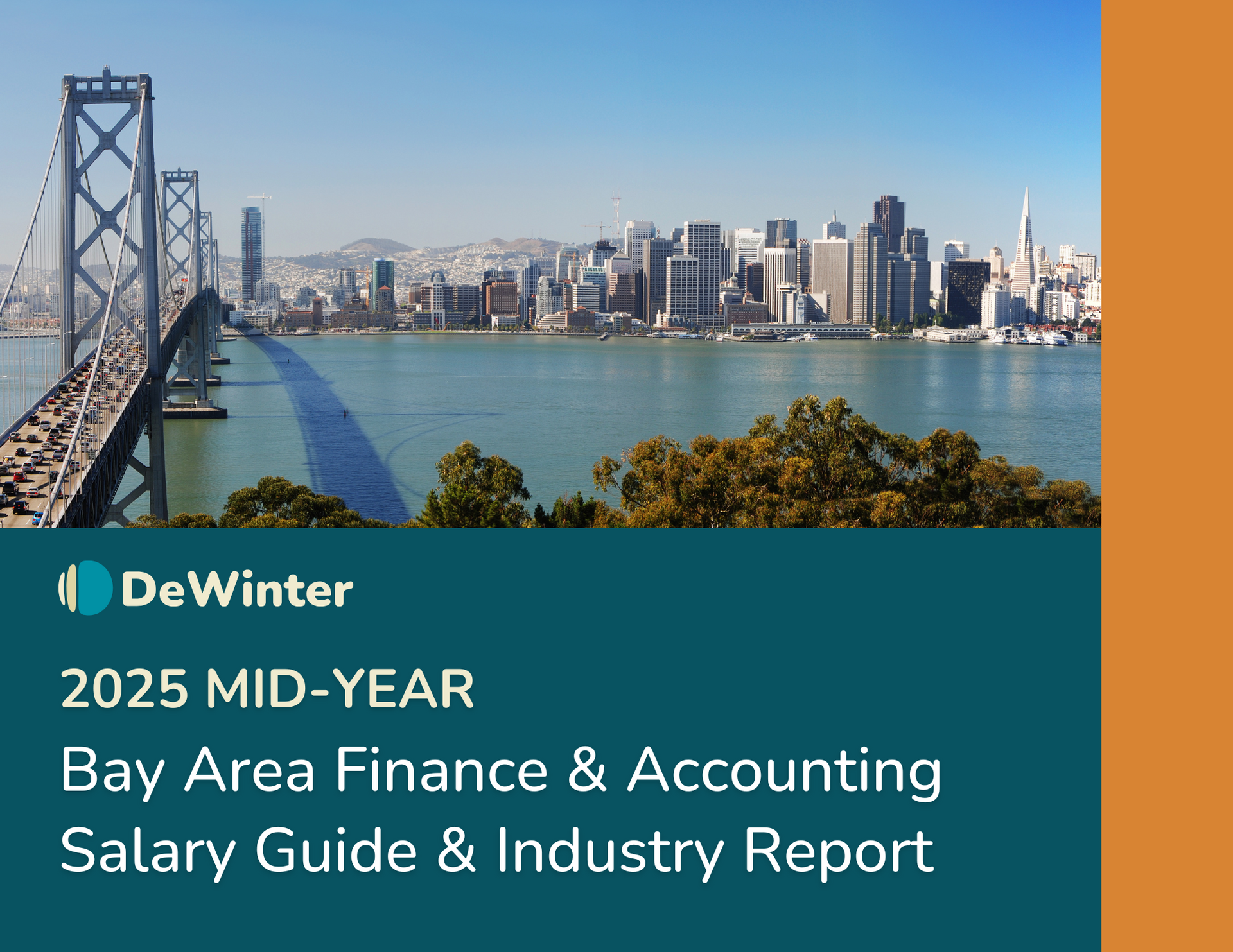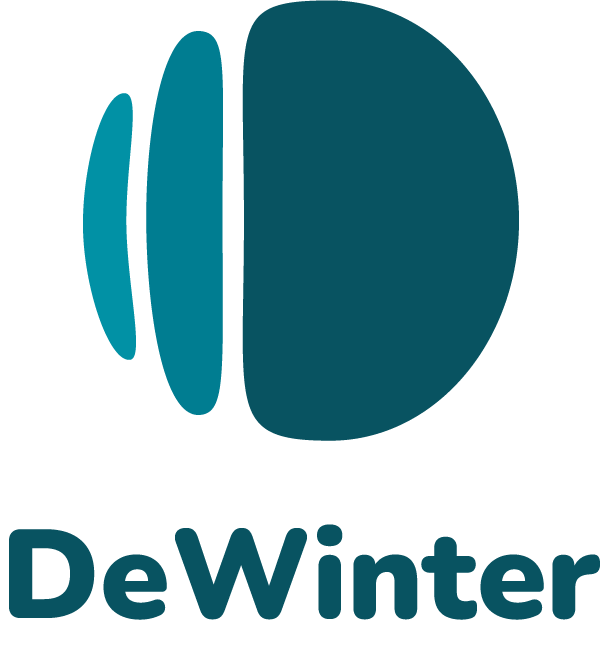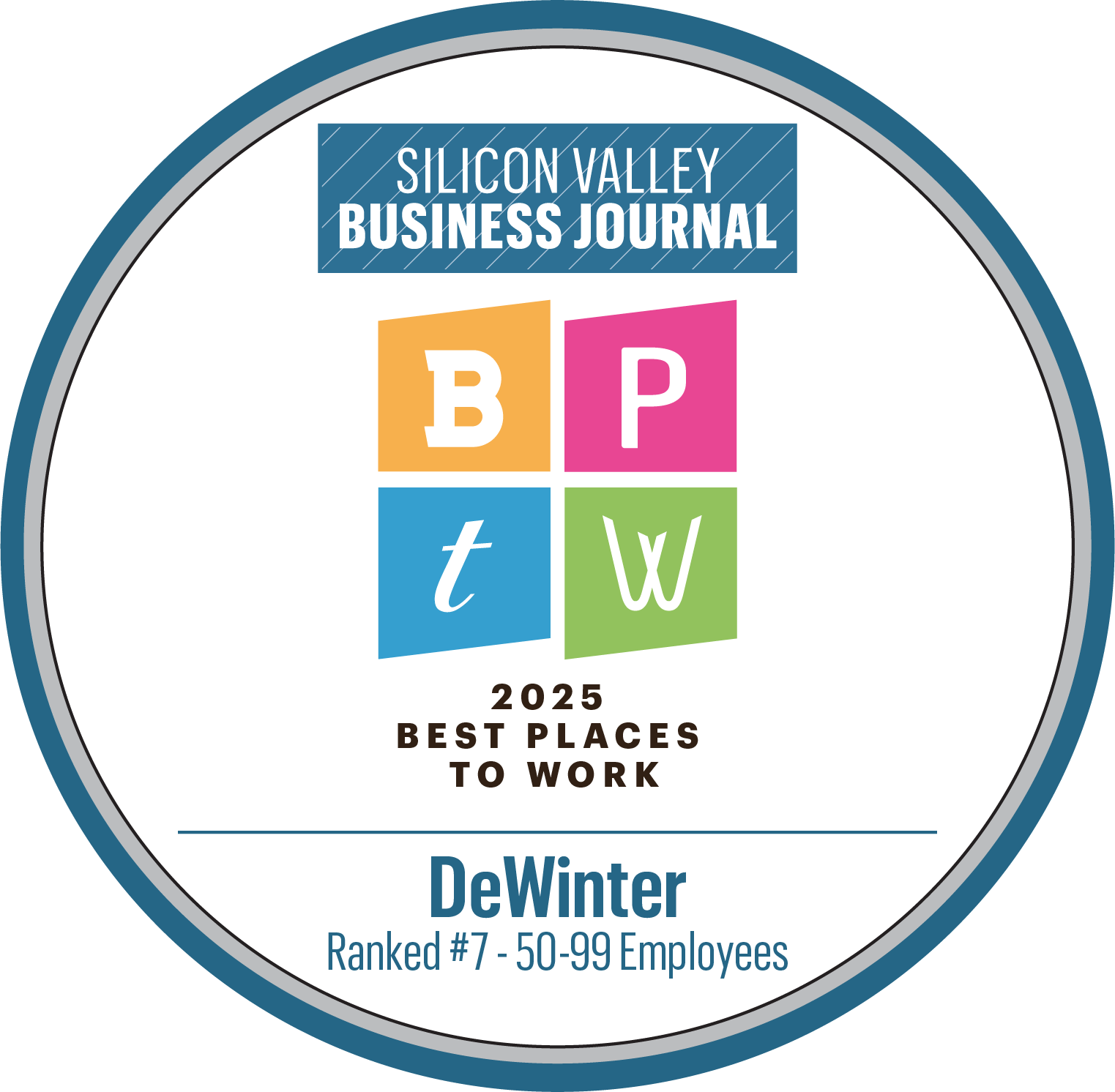About The Episode
In this episode of the DeWinter Difference, Derek chats with Anarghya Vardhana, a Partner at Maveron, an early-stage, consumer-only venture capital firm that invests across the US in end consumer brands. Anarghya shares her insights on finding career success through authenticity, the key traits she looks for in leaders before investing, and her professional journey from Stanford to Google and eventually to the world of Venture Capital.
Learn more about the DeWinter Difference podcast and share your thoughts and comments at DeWinterGroup.com/dewinter-difference
About Anarghya Vardhana:
Anarghya spends her time understanding consumer and cultural behavioral shifts, identifying the billion-dollar businesses that will emerge, and partnering with the right founders to help grow those startups into iconic consumer brands. She is particularly interested in companies improving the health and wellness of large populations and she has invested across early stages and sectors such as mental health (Two Chairs, Tempest), women's health (Alife, Odela), rare disease (Allstripes), healthcare platforms (Goodbill), and connection and community for wellness (RecRoom, Co-Star). Prior to joining Maveron seven years ago, Anarghya was a seed investor and a product manager at several startups, notably Medable in the healthcare space. She started her career at Google and has been in the Bay Area tech scene since her undergraduate years at Stanford, where she studied Science, Technology, and Society, graduating with honors with a focus in Human Biology, and Mathematics. Anarghya was listed on Forbes "30 Under 30" for venture capital, won the Diversity Champion Awards from Forbes and JP Morgan Chase, was nominated for the NVCA's rising star award, and gathered several accolades during her time at Google. She is a Kauffman Fellow, and an active participant in All Raise and other diversity initiatives in tech and venture capital. Anarghya hails from the pacific northwest, is a slow marathoner, and is an Indian classical dancer (Bharatanatya).
About Maveron:
Maveron is a consumer-only venture capital firm that empowers consumers to live on their terms.
Listen now at the streaming sites listed.
Learn more about the DeWinter Difference podcast here and share your thoughts and comments below.
Episode Transcript
This transcript has been edited for length and clarity.
Derek DeWinter: Welcome to our listeners who are tuning into the DeWinner Difference, an audio podcast where I spend a bit of time with incredible executives I've known for years, and you get to listen in. I hope that our conversations are unique, insightful, short enough to hold your attention, but long enough so that you get some great takeaways that you can apply in your own careers, lives, and relationships.
Today, I'm excited to speak with Anargya Vardhana, a general partner at Maveron LLC. Maveron is an early stage consumer only venture capital firm that invests across the U. S. in end user consumer brands. A few of Maveron's investments include eBay, Zulily, Allbirds, Common, August Home, and Trupanion, to name just a few. We'll let Anarghya share more about that shortly, but as it relates to our paths crossing, that happened way back in about 2011 or 2012, just a couple of years after she graduated from Stanford with a BS in Science, Technology, and Society. Anargya spent time at Sandia National Laboratories as a security research scholar, Google, and sits on multiple boards in a role as investor and advisor with Navron, Anargya, thanks for joining us today.
Anarghya Vardhana: Hi, Derek. Thank you for having me. Gosh, I haven't received my Sandia days in a while. Thank you for that throwback shout out.
Derek DeWinter: We'll see if we can get you to divulge a few things here as we go through this process. I do think you're the only person we have talked to that has worked in a nuclear facility. So you don't have to, you know, start there, but maybe at some point in time, we'll have you talk a little bit about that.
Could you share a little bit about your background culminating where you are today and what areas in venture investing you're focused on above others?
Anarghya Vardhana: Yes, absolutely, and thank you again for having me. I'm Anargya Vardana, excited to be here today. You know, my story kind of goes back to being born in India and then moving to the U. S. shortly after my second birthday. I grew up in Oregon in the Beaverton area, which is a suburb of Portland. Beaverton is mostly known for being Nike town, and I'm a diehard Nike girl, just from a function of having been raised there and from Oregon. I made my way down to California to go to Stanford and have been here ever since I wanted a career in technology and this was the place to be back in 2010 and continues to be. Certainly very central to technology, if not still core, obviously, some of the remote work and pandemic things have shifted things around.
The Bay Area is certainly thriving and has a very strong technology scene. It feels like the right place for me to be in terms of my path to Maveron and to venture capital, as Derek mentioned, I did a number of different internships in college, one of them being at Sandia National Labs, working on nuclear and radiation detection, working on wide area restoration after disaster. That really got me interested in thinking through how science and technology can be applied to society and how Humans, regular people living their regular lives, impact the technology around them and morph it to fit their needs and how simultaneously technology changes the way we live, we behave and frankly changes culture. That was pretty much what I studied at Stanford, doing an honors thesis in cell phones in the rural sector of developing countries from Stanford. I made my way to the mothership of Google and I was there for three years working on a number of different products right before I left. I was working on AdWords Express, which is a local ads product, think restaurants near you, dentists, chiropractor, any kind of business that is local that you may drive or walk to or train to, I guess from Google.
I really wanted to try my hand in the startup world and I was seeing a lot of my classmates and peers from Stanford drowning, swimming, thriving, diving into startups and felt envy at the level of learning they were experiencing.
I'm kind of a hardcore person, I guess is the way to put it. I was envious of the hours they were putting in the startup world, the impact they were having, how every hour seemed to matter. I wanted that for myself, so I jumped into the startup world head first and learned a lot, spent a couple of years at a number of different startups, I say learning a lot, mostly what not to do. I learned some really tough lessons from startups that didn't work out. I'd like to think that they have made me a grittier person today and hopefully a better investor and a more empathetic investor today.
In 2015, I made my way over to venture capital and for those of you who are listening and who may not really know what venture capital is, I didn't know that much either. I got exposure through startups and basically startups raise money from, from VCs and VCs then thereby buy a small percentage of that company and advise them and hopefully help them grow from what we say obscurity to ubiquity.
I joined my firm Maveron in 2015.
Maveron has been around for 26 years now. It was founded by my partner, Dan Levitan and Howard Schultz, the former CEO of Starbucks. They really came together off the premise that there should be available capital advisory and an opportunity for consumer companies to grow and thrive and to become household names. Obviously that first company for them was Starbucks, which went from a little tiny coffee company to the coffee brand globally and did that again with companies like eBay, Groupon, Tropanion, and Shutterfly.
I've been there for eight and a half years. I've invested in a number of different businesses across a number of different sectors, but really my focus is in the health and wellness space. I've invested in businesses focusing on mental health for adults and children, reproductive care, rare disease, primary care, and a whole set of things. Investing at the early stages is really the bread and butter being series A.
I live in the Bay Area with my husband and two kids and the one thing that I like to do outside of work and spending time with family is running. I'm a pretty avid runner, mostly a trail runner but if you don't find me in front of a computer or with my kids, I'm probably on a run.
Derek DeWinter: Well, you made the comment envious of the hours that your colleagues were working in the startups, which must sound crazy as a mother of two.
Anarghya Vardhana: Totally
Derek DeWinter: Specifically target venture when you were leaving the startup world. When you left those operating roles, were you looking at A variety of different VC firms.
Anarghya Vardhana: I wasn't really considering VC. I was actually approaching it as what's another startup I can join and what's a good way to meet great startups while going through VCs because startups are in their portfolio. So that's how I got exposed to VCs, talking to different friends and folks I knew in venture capital and saying, hey, are there any top companies in your portfolio? Companies you're excited about?, companies I should meet and consider for a product manager role? Which was kind of the operating chops that I had at the time and that's kind of when one thing led to another, and it went from, can I join a portfolio company to maybe I will join you. I don't know much about venture capital, but I'm a halfway decent product manager so maybe I can help portfolio companies, if you can in turn teach me and mentor me in learning about venture capital.
Derek DeWinter: You could probably make this comment about any specific time period in a venture, which is when you started your career in venture at a pretty interesting time.
Anarghya Vardhana: Yeah.
Derek DeWinter: Would be true if it was 30 years ago, or 5 years ago, or 2 weeks ago. But, you started in 2015, which was a time period that was pretty interesting and pretty uniquely marked in the industry with kind of sexism and discrimination allegations, which we don't need to go into great detail of, but it was a pretty unique time period.
Can you comment on that for you as a new venture capital professional. At that part of that stage of your career as a woman and a woman of color in the venture industry.
Anarghya Vardhana: Yeah, to take it back a little bit more for me and my own identity in, in the different fields I've been in you know. Different kids have different things they do in high school, different activities.
For me, my thing was science fairs, I was a science fair kid, and I guess I still probably identify with that. You know, some people are athletes, some people are musicians, some people are the funny kids in town. I was the science fair kid, and I started doing science fairs in middle school and that was, you know, what took up most of my time outside of school was science fair stuff. I did independent math research, submitted papers, applied to many science fairs, competed in many science fairs, both at the regional, national, and international level. The reason I share that is because the main field I was in was mathematics. Within that, a specific field was the field of number theory, which is the study of whole numbers. I specifically focused on prime numbers and as you can imagine back then, you know, this is the late nineties, early two thousands, there were not a lot of girls in the science fair circuit.
Within that, specifically in math, they were, if there were that many girls there, they were in maybe different fields and, and not necessarily in math. So, I have had many experiences being the one of few girls or if not the only girl in my advanced math classes and in that early rigorous extracurricular activity sphere of my life for a long time.
So, that's kind of been my experience, and you know, Google was a really interesting place for me because I worked with a lot of women. I worked with a lot of diverse people. I certainly don't know what it's like today, but my first manager was a woman, I had a couple of different managers, all but one were women.
The senior leadership were women I had a lot of female colleagues and many of them were technical product managers, engineers. It was a great experience for me, for one of the first times in my life, not to be the only woman, and it was important for me to have that kind of work environment. But then I went to startups and, you know, the first startup I was at was in the FinTech space and I was the only woman on the technical side of things.
I'm not an engineer, but I was the product manager and there were no other women in engineering or product or design. I realized how much I kind of wanted to go back to the experience of not being the only one. It was important to me for a variety of reasons, but also culturally I felt like that diversity would make for a stronger team, a better team, a team with more opinions and more diverse opinions and diverse voices.
When I was speaking with a number of different VCs and some of them started to say, hey, would you ever consider working with us? One thing that was very important to me was that there was at least another woman around the table. Most specifically that there was a path for a woman to be a senior person at the firm. That was certainly true at Maveron. Maveron has always had at least one female check writer around the table in the 26 years of its history, something we're very proud of. We invest in consumer businesses, and a lot of them are founded and run by women.
That's kind of been core to the DNA of Maveron since the early days and researching that history and realizing that was very important to me. Finally, I saw junior people joining as senior associates, which is what I joined as, and I had risen through the ranks, been mentored and guided to then become principals, partners, and then eventually general partners.
Seeing that precedence was important to me and I give you that history because yes, while I did join venture capital in an interesting time, especially to be a woman and to be a woman of color, I felt like I was in this very powerful, supported and really ideal place to be. As a young person starting off as a senior associate in venture capital and for that place to be Maveron and you know, there was a woman who was a general partner and she was an incredible champion for me, but it wasn't just her. My partners, Dan and Jason, who are still my partners today have been mentors, coaches, champions of me since day one and have really pushed me to succeed and have supported me in coming up through the ranks and in becoming a general partner.
I know not everyone has had those experiences and those opportunities and you know, haven't been as lucky as me. I think part of the advice I got early on was to create a close knit group of other women who were starting venture capital around the same time as me, I did that. There's a group of like eight or 10 of us who started around that time. We would do dinner once a month and have really kept close through the last eight, nine years. It has been incredible to watch each other's careers grow and develop. I think that was key and feeling kind of connected and supported through my early days of VC.
Derek DeWinter: Well, no doubt. This is maybe just a statement versus a question. It sounds like you have great intentionality around that in terms of paying it forward. To those around you which is awesome. So we met when you were younger. Well, I was much younger. I say that because I look 10 times worse. It's a good thing, this is an audio podcast.
As you look back on your career today, and I heard you talk about this a little bit in a speech you gave in Boston. I can't remember what it was exactly, but, you know, the attributes that we believe are important when we're younger can very often be attributes we don't find important when we are older, smarter, and wiser as we move along our careers and lives.
What were some of the attributes that you felt were really important when you were the 25 year old version of yourself? What do you thin those attributes are now that make somebody not just successful, but like a person worth being around in the professional world.
Anarghya Vardhana: That's a great question, I think one of the biggest lessons I've learned in terms of how to approach who you are in a professional setting is to be really authentic to yourself. Let me dig a little bit in terms of what I mean by that. I feel like when you are a young person in your professional career, maybe in tech, there are so many archetypes of what you could be like, you could be this kind of VC or this kind of founder or this kind of product manager.
Earlier we were talking about the pressures of growing up with social media. I don't think it's that different if you're, you know, say 25 years old in tech, you see so and so's tweet, you see so and so's YouTube video, you listen to this podcast and you're like, okay, I want to be like them so I'm going to mold my style, my approach, my thoughts to fit this person or to fit the style, because I aspire to be like them.
I think what I have learned time and time again is that the beauty of venture capital is that you get an opportunity to make it your own. Each person has their own style and it has never served me well to try and mimic someone else who I admire. Sure, I can learn from them and pick up things here and there, but I think that the best people in this field are so true to themselves.
What do I mean by that? If they're just a brutally honest, direct person, they just stay brutally honest and direct. Even if other board members are approaching it slightly differently or other board members are maybe delivering a message in a way that is not as direct or might not be perceived as brutally honest. I think the best board members stick to their style and embrace it and. Obviously try to be respectful and kind, you know, within your style, but going after how you approach the world and continuing to stay true to that, I think makes for a really good professional in this field.
I think if you had asked me you know, 10 years ago, if I agreed with that statement, I might say, you know, there was a right way to do this and you do need to kind of follow and figure out that right way and look to the greats and kind of model yourself after them.
Derek DeWinter: I wholeheartedly believe there's a million ways to solve puzzles and do things. I think the folks that try to be someone else generally have some of the more difficult paths forward because that's hard. That's really difficult.
Anarghya Vardhana: It's hard to fake it for a long
Derek DeWinter: It sure is, we went over this a little bit in advance of doing the podcast so I didn't give you this question at all in advance. I'm going to throw a curveball at you. One of the thoughts I had was about what attributes tyou look for in a founder or CEO. I thought maybe a more interesting one is what are the attributes you look at and go like, oh my goodness, not this again, or like there's no way I'm touching this simply because of this spidey sense that I have around it. You know, a vibe that somebody is giving off around this type of lack of emotional intelligence or style or something.
Anarghya Vardhana: Yeah, I'll answer both, some of this I've learned the hard way, but I think building a company and investing at the seed and series A stage to early stage building a company is so freaking hard. Building a venture scale company, building any company is probably very challenging, but building a venture scale company, the demands are incredibly high.
You have to grow incredibly fast, you have to be able to manage an incredible amount of stress, and a lot of your time, you know an inordinate amount of your time and energy passion, and mental power needs to be devoted to it. I think that because of that founders have to be extremely passionate and obsessed with the idea that they want to work on and have to have a clear reason for why they're working on it.
The why may not be very mission driven, purpose driven, doesn't matter. They just have to have a very strong reason for why they're working on it. Otherwise it makes it way too easy to give up. So one of the first things I'm looking for is: Is this person kind of off the charts obsessed with working on this?
One of the Maveron values that we talk about is being unapologetically non- normal. So I'm trying to assess whether the founders are unapologetically non-normal about working on this specific thing. The second thing is related to the first, I think founders have to be very gritty, I want to understand what challenges they've overcome in their life.
For every person that could be different I think that the founder profile that I work best with is founders who've overcome something or a couple of things in their past. It could be personal, it could be professional, but they have the grit and the tenacity to persevere and to keep going despite dead ends, despite failures, despite falling completely flat on their face.
The third thing I'll share, of course, there's many things, but the third thing I'll share is I want to invest in people who are smart and have a point of view and are confident in themselves to learn and take feedback. It is very tough if a founder feels like they need to be the smartest person in the room because then they don't learn, they don't grow.
Most importantly, they don't hire people who are better than them. They lack the confidence to hire Jill down the street because they think Jill is smarter and they're intimidated by her and they're not going to hire her. That is a huge detriment to the business. So those are the three kinds of things that I'll share with you that off the top I will look at.
And then kind of the things that are yellow flags or stay away from I think that flip the last thing I shared that founders who feel like in the pitch meeting, I may push back a little. I may ask questions. I may say, what do you think of this? What do you think of that to gauge whether they have that learning and growing mentality, but are able to also be confident in their approach.
There are some pitches where a founder gets almost defensive and aggressive and pushes back on a differing opinion. That is a flag for me, another thing is, I think that when you are building a venture capital backed company, you have to have an aspiration for big with a capital B.
I tell founders, not every company needs to be venture backed. That is completely okay, there are plenty of amazing businesses in America that don't take or have not taken a single dollar of venture capital money, and they are great businesses. One can do that but a founder who doesn't want to build something huge and doesn't have the aspiration to build something huge that is evidenced in the pitch meeting, that's also a yellow flag for me to stay away from.
Derek DeWinter: Interesting, you have been very gracious with your time. And so this is the point in the podcast where we get to flip the script a little bit and you get to ask me a question.
I don't know what it is you've maybe had some time to prepare for what it is and may give me a giant zinger, which I'll fumble around with, but this is your shot at me.
Anarghya Vardhana: You know, I have a number of questions, but let me stick to one, which is going to be indicative of the different ages and stages of career that the two of us are at. I entered the workforce in 2010 recently until the last two years where it has just been a colossal shift.
I myself have been grappling with it, I've seen my peers grappling with it. Frankly, I've seen a lot of people leave venture capital, leave tech, a lot of disillusionment and you know, given the ages of our children, I'm assuming you've got a couple of years on me and I would love to hear what you saw in the different, ups and downs of the market that you lived through, worked through, what you saw then, what's different now, and any kind of predictions or thoughts you have for what we will see over the next 12, 18, 24 months from a private public market standpoint.
Derek DeWinter: I have been through a million cycles. I started my career back in 1993, a whole big, long time ago and have been through a variety of ups and downs. You know, the .com crash, the financial markets crash, 9/11, and a variety of massive world events that have happened.
COVID has been has had kind of the most profound effect on our outside of business and where it's really kind of pushing people into their homes, around the people that they care about, if they're fortunate, hopefully into their homes, around people they care about, you know, contemplating the next version of their lives, what that may look like.
The older you get, like me, I'm in my 50s, early 50s, that is, you start to really contemplate the why of the next thing you're going to do, which is why you talked about like a founder. What's the why of your business? You start to think more about the why of your life and the opportunity cost of doing the next thing is significantly higher than when I was at 24.
I could make a mistake at 24 and I would be able to bounce back from most of them. You start making a few mistakes when you're 52 or 3 . There's life in the rearview mirror that you're not getting back, what's in front of you is, I mean, just logically a little bit shorter so you really want to maximize that.
I think, you know, kind of summarizing that all up, I feel like that has had a really profound impact on our work experiences, our work commitments, how we spend our time, how much time we spend at our workplaces in a way that was really different than anything that has ever happened prior to this.
I'm still kind of grappling with how to process this all because, I mean, this is one of those situations to where we were all in the same boat and that did not apply, you know, in the different examples that I used before, whether it's a financial crisis, .com bust, or you know, the big boom or whatever it might be.
Not everybody participated in each of those things. This is one where we all kind of participated together across all kinds of different socioeconomic landscapes and, you know, Where you lived and how you lived. It's been pretty profound. I don't have a great answer as to where this is going to take us.
It feels like, now, a few years into this world, sort of coming back to a version of normal, and maybe it's a better, maybe it's a better version of normal, because maybe we were living in a little bit of a world of abnormal from a pure market perspective. I'm super good at predicting the future.
So, you know, bear with me. Notwithstanding the fact that this is an election year, which is always, now, clunky there are a lot of, and I just hate using this word, but everybody does. There's a lot of dry powder. There's a lot of this. There's a lot of that. VCs don't like to sit on money.
Private equity does not like to sit on money. Your job is to deploy funds and to get things moving up and to the right. So there's only so long that that can remain on the sidelines. We are going to get into the middle and second half of 2024 with a directional beacon that gets us back to a better place.
Anarghya Vardhana: Yeah. No, that's all super helpful and thoughtful. So thank you for sharing you know, both the first part, if we have, you know, 100 coins to give around to all the different things in our day, work, personal life, kids, our own health, I do agree. I think people have been forced to become more thoughtful about it and perhaps think more about it.
Given the huge health crisis that happened and then to your second part I'm also optimistic and hopeful that the second half of this year and then early next year, we'll start to have a pickup in pace. That's not just AI oriented, but, but broader than that. So definitely looking for that slight shift to happen this summer.
Derek DeWinter: Let's both cross our fingers for sure. Well, I get to set you free now. Thank you so much, Anarghya, I really appreciate it. Mavron hired this amazing person back in the day and she's taken full advantage of all opportunities in front of her, and she had a focus on primary numerical something or other thing that I can't possibly understand.
My guess is you probably are about the smartest person in the room when you enter most rooms, so don't hold it against anybody. I hope our paths cross again real soon, I really do appreciate your time.
Anarghya Vardhana: Well, thank you so much for having me. It's always a treat to spend time together and looking forward to seeing you soon.
Derek DeWinter: All the best.

